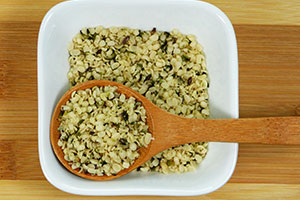
Fun Fact
Hemp was first grown in North America in the 1600’s to produce ropes, sails and clothing.
About Hemp Seeds
Today, hemp has many uses including oil and seeds for nutrition and commercial products, such as clothing, shoes, paper, and construction materials.
Hemp seed is a member of the Cannabaceae botanical family. Another famous member of this botanical family is hops which are used to make beer.
Though hemp seeds and marijuana are members from the same species called Cannabis, they contain a different chemical composition.
The hemp plant does not naturally contain THC, otherwise known as tetrahydrocannabinol, which is the psychoactive ingredient in marijuana.
Per the 2018 Farm Bill, hemp products must contain less than 0.3% of THC to be legal.
Nutrition Information
Hemp seed is an excellent source of manganese, vitamin E, magnesium, phosphorus, zinc, and iron. It is also a good source of protein.
- Manganese helps form cartilage and bones and encourages wound healing.
- Vitamin E supports immune function and blood vessel formation.
- Magnesium regulates blood pressure and blood sugar.
- Phosphorus promotes energy production and storage.
- Zinc aids in nervous system function.
- Iron assists with reproduction, growth, and development.
- Protein helps build and repair bones and muscles.
Purchasing, Storing, Preparing
- Unhulled hemp seeds contain a hard outer shell. Hulled hemp seeds, otherwise sold as hemp hearts, have the hard outer shell removed to produce a soft inner kernel that is easier to eat.
- Hemp seeds, hemp oil, and hemp protein powders can be purchased at many grocery stores throughout the U.S.
- Once open, store hemp seeds in the refrigerator or freezer to extend the shelf life.
- Sprinkle hemp seeds on grain dishes, yogurt, smoothies, cereal, and salads.
- Hemp oil has a low heat point so avoid using it as cooking or frying oil. Instead, it is best used as a dressing or drizzled over your favorite dishes.
Nutrition Facts
Hemp seeds, hulled 30 grams or 3 tablespoons
- Calories: 166
- Protein: 9.48 g
- Fat: 14.6 g
- Carbohydrate: 2.6 g
- Fiber: 1.2 g
- Calcium: 21 mg
- Iron: 2.38 mg
- Magnesium: 210 mg
- Phosphorus: 495 mg
- Folate: 33 µg
- Vitamin A: 0.3 µg
Via fdc.nal.usda.gov
Recipes
Request an Appointment